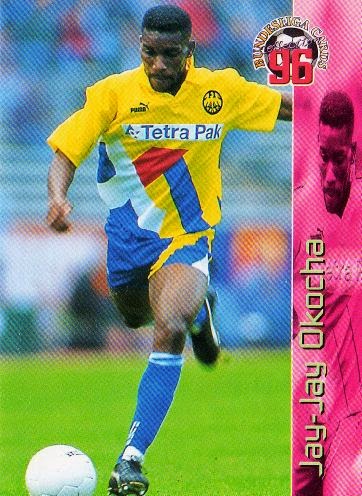In this seventh episode of Wednesday’s Special, The
Writer will bring readers into the life and brief story of a weekly selected
footballer. Today, readers will have the chance to meet one of the greatest talents
from Africa, Jay-Jay Okocha; albeit in words only.
Okocha’s real name is Augustine Azuka Okocha. Sounds
a bit like a Japanese name right? He actually got his famous ‘Jay-Jay’ name
from his older brother whose named is James. James started a football career first
and was simply called as ‘J-J’ among his teammates in Nigeria. Then this
younger brother, Augustine, borrowed his brother’s nickname and it stuck until today
as ‘Jay-Jay Okocha’. Okocha is widely regarded as the best Nigerian player of
his generation and is certainly among the best African players of all time. He
was known for his step-over skills, excellent free-kicks, fantastic dribbling
ability, and midfield playmaker role. For the record, Okocha holds a second
nationality which is Turkish having acquired it while playing in Turkey. His Turkish
name is Muhammet Yavuz.
Okocha’s career started in Nigeria where he joined
Enugu Rangers in 1990. Within the same year, he was invited to go to German by
a friend and luckily he impressed in several training session. Soon after that,
he was offered a contract to play for a Third Division German club, Borussia
Neunkirchen. Later in 1992, Okocha got a transfer to Eintracht Frankfurt where
he plied his trade with several African big name players such as Tony Yeboah
and Thomas Doll. One of the highlight during his stay at Frankfurt was a goal
he scored past Oliver Kahn. The goal was voted as the Best Goal of The Year 1993.
Unfortunately his stay at Frankfurt didn’t last long as he was involved in a feud
with manager, Jupp Heynckes and later left the club following the club’s
relegation to the 2nd division in 1996.
Okocha signed for Fenerbahce in July 1996 and
managed to spend two fruitful years at the club. He scored 30 goals in 62
appearances which were mostly through his trademark free-kicks. In his time at
Fenerbahce, he gained the Turkish citizenship and was worshipped by the fanatic
fans of Fenerbahce. After two years, Okocha was bought by Paris Saint Germain
for 24 million thus making him as the most expensive African footballer at that
time. He stayed for another four wonderful years at PSG and was regarded as the mentor for the
upcoming young Brazilian superstar in the name of Ronaldinho.
Then after the World Cup 2002, Okocha decided to
leave PSG for free after his contract expired and later joined Bolton Wanderers
of the EPL. During his time at Bolton, he once again scored a wonder goal which
was voted as the Best Goal for Bolton in the new rebranded EPL era. He was made
the fans’ favorite as early as in his debut season because of his excellent
performance for Bolton and he was made the captain of the club in his second
season. As captain, Okocha guided Bolton to the 2004 League Cup Final where
they finished a respectable runner-up placement. He was regarded as a legend at
Bolton and even had the fans singing a song specially made for him. Among the
lyrics in the song are “Jay-Jay – so good they named him TWICE…laa laa laaalaa laa laa”. In all, his stint at Bolton was
among his finest and the EPL never forgot his presence there to this day.
In 2006, Okocha left Bolton and joined Qatar SC. His
career at Qatar was not successful and in just one season, he left to England
again. Hull City was Okocha’s next destination in 2007 as he once said “God has
told me to join Hull City”. However his stay at Hull was once again not a
successful one and soon after Hull’s victory towards gaining promotion to the
EPL, Okocha decided to retire from football for good. Going into his
international career, it is fair to say that Okocha really excelled on the
international stage as he got the chance to win more trophies and awards than
at club level. He won the 1994 African Cup of Nations, 1995 Afro-Asian Cup of
Nations, 1996 Olympic gold medalist for men’s football, and several Player of
The Tournament & Golden Boot Winner awards. Okocha was also appointed as the
Nigeria’s national team captain in 2002. He retired from international duty in
2006 after persistent injuries affected his performances.
Jay-Jay Okocha had never been voted as the African
Player of the Year although he was highly regarded as one of the best players
of his generation. It was mainly because of his sometimes over-the-limit bad
behavior off the pitch and also his closest challengers for the award at that
time often got one step above him for the calendar year. However, Okocha was
included among Pele’s 125 greatest ever football legends that were still alive
in 2004. That was what sums up Jay-Jay Okocha’s 18 years of footballing career.
A legend!













No comments:
Post a Comment